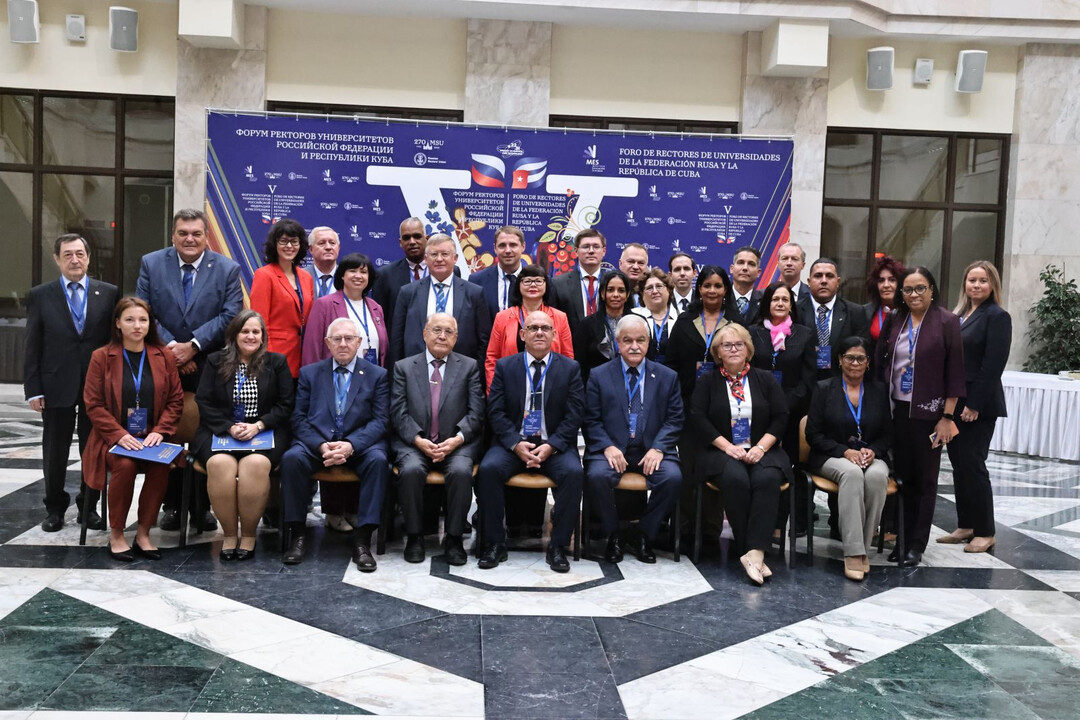
Amidst Deputy Prime Minister Chernyshenko's visit, beyond investment and aid, educational cooperation strengthens, supporting Russian language education and admission to Russian universities.
While Russian Deputy Prime Minister Dmitry Chernyshenko's visit to Cuba is assessed to have brought more benefits to Cuba in terms of investment and aid, it appears that Russia has made significant progress in the education sector, at least. Last Friday, a branch of the Southern Federal University (SFU) finally opened in Havana to educate Cuban students and prepare them for admission to Russian universities.
According to Russian media reports, this branch is the first instance where the Cuban government, which nationalized and monopolized education since 1961, has permitted the establishment of a foreign university. It was established with the approval of the University of Havana, which reportedly provided facilities to SFU free of charge. Deputy Prime Minister Chernyshenko proudly announced this "significant advancement in educational cooperation between Cuba and Russia" on social media, praising Vladimir Putin's "distinguished" envoy.
The exact location of the SFU branch, not disclosed by authorities, is scheduled to officially open in September and plans to offer programs aimed at educating Cuban citizens as well as preparing them for admission to Russian universities. However, the opening was somewhat delayed compared to the initial goal of graduating its first students by next summer.
Russian media reported, "Initially, this faculty will operate as a preparatory department. Additional vocational training programs in Russian will be offered to Cubans. Local residents will prepare for admission to Russian universities. Furthermore, the branch will organize Russian language courses and programs in various fields of study. In the future, SFU plans to allow students to begin their higher education there."
Against the backdrop of a Russian banner featuring the faces of President Vladimir Putin and Cuban President Miguel Díaz-Canel, Deputy Prime Minister Chernyshenko celebrated the opening of the branch as evidence of the two countries' relationship. SFU Rector Marina Borovskaya responded, "We have already successfully completed numerous joint research and training projects and exchanged experiences with the University of Havana, a long-standing friend and reliable partner of our university. Last year, Cuban students and faculty visited SFU to learn about the university, receive training, gather information for research projects, and meet colleagues to continue joint research."
In line with SFU's move, another Russian university, Glazov State Pedagogical University, also signed a memorandum of understanding (MOU) this week with a partner university in Havana. According to Russian media, the goal of this cooperation is also to develop Russian language learning programs for Cubans, as well as to establish dual degree programs.
Yanina Chigovskaya-Nazarova, Rector of Glazov State Pedagogical University, stated, "During this working visit, we specified new areas of joint work with our Cuban colleagues, including dual degree programs, the development of Russian as a foreign language teaching and methodology complex for Spanish-speaking audiences, and the introduction of Russian in schools. We are pleased to be at the forefront of the development of Russian-Cuban relations."
She emphasized her university's commitment to supporting Russian language learning not only in Cuba but throughout Latin America, adding, "Our university has been supporting the study of Russian in Latin America for three years, and thanks to this effort, we are seeing how the linguistic landscape of the region is changing." She also explained, "With the support of the Russian Ministry of Education and Science and the 'My History Foundation,' eight Russian language learning centers have been established in Cuba, and about 1,000 students graduated from these centers last year."
The tangible benefits Russia has gained from training Cubans since the Soviet era are not clearly known. The indoctrination of values advocated by the Kremlin did not take deep root before 1989, and more than 30 years later, there are few signs that Cuba is more favorably inclined towards Putin's Russia.
Russia and Cuba have historically maintained close ties, especially during the Cold War when they cooperated in various fields such as politics, economy, and military affairs under strong Soviet support. After the collapse of the Soviet Union, relations between the two countries became somewhat strained. However, recently, amid deteriorating relations with the United States and Western sanctions, Russia has been seeking to expand its influence in the Latin American region, and Cuba has emerged as an important partner in this regard.
The establishment of the SFU branch can be interpreted as part of Russia's strategy to expand its influence within Cuba through the education sector in this context. By strengthening Russian language education and providing opportunities for admission to Russian universities, Russia may aim to familiarize Cuba's young talents with Russian culture and values, and to build long-term friendly relations.
However, given the Cuban government's strict control over the education system, the background to allowing the entry of a foreign university likely involves complex factors such as economic difficulties and the need to cultivate human resources. Cuba has been facing difficulties in developing professional personnel due to the recent economic crisis and the increasing emigration of young people, and it may seek to address these issues through cooperation with Russian universities.
In the future, Russian-Cuban educational cooperation is likely to expand beyond simple student exchanges to include joint research, faculty exchanges, and curriculum development. In particular, by strengthening cooperation with Cuba in science and technology fields where Russia has strengths, it is expected to contribute to Cuba's economic development and industrial modernization.
However, some raise concerns that Russia's entry into the education sector could infringe on Cuba's sovereignty and educational autonomy. In particular, the promotional approach featuring the faces of President Putin and President Díaz-Canel has raised suspicions that political intentions from Russia are involved.
In conclusion, Russia's advancement into the Cuban education sector can be a significant opportunity to strengthen bilateral relations. However, from Cuba's perspective, a cautious approach is needed to secure practical benefits while protecting its own education system and sovereignty.
[Copyright (c) Global Economic Times. All Rights Reserved.]






























